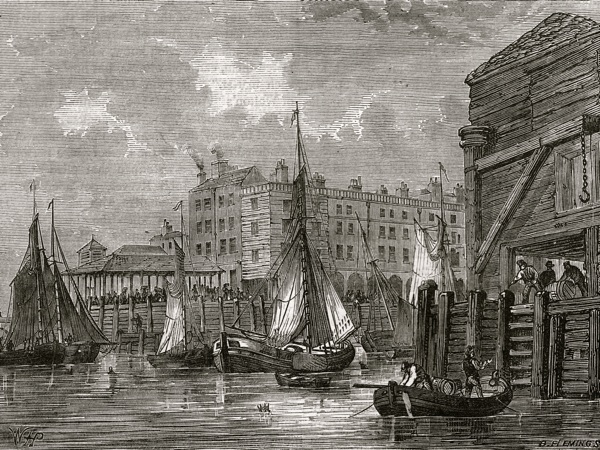A Walk In Long Forgotten London
If you got lost in the six volumes of Walter Thornbury’s London Old & New you might never find your way out again. Published in the eighteen-seventies, they recall a London which had already vanished, in atmospheric engravings enticing the viewer to visit the dirty, shabby, narrow labyrinthine streets leading to Thieving Lane, by way of Butcher’s Row and Bleeding Heart Yard.
Butcher’s Row, Fleet St, 1800
The Old Fish Shop by Temple Bar, 1846
Exeter Change Menagerie in the Strand, 1826
Hungerford Bridge with Hungerford Market, 1850
At the Panopticon in Leicester Sq, 1854
Holbein Gateway in Whitehall, 1739
Thieving Lane in Westminster, 1808
Old London Bridge, 1796
Black Bull Inn, Gray’s Inn Lane
Cold Harbour, Upper Thames St, City of London
Billingsgate, 1820
Bedford Head Tavern, Covent Garden
Coal Exchange, City of London, 1876
The Cock & Magpie, Drury Lane
Roman remains discovered at Bilingsgate
Hick’s Hall in Clerkenwell, 1730
Former church of St James Clerkenwell
Door of Newgate Prison
Fleet Market
Bleeding Heart Yard in Hatton Garden
Prince Henry’s House in the Barbican
Fortune Theatre, Whitecross St, 1811
Coldbath House in Clerkenwell, 1811
Milford Lane, off the Strand, 1820
St Martin’s-Le-Grand, 1760
Old Bethlehem Hospital (Bedlam), Moorfields, in 1750
Images courtesy Bishopsgate Institute
You may also like to take a look at










































My head tells me: poor diet, parlous health, hideous dentistry, awful odours (and no sanitation), heart-breaking poverty and casual cruelty to man and beast alike. My heart says something else entirely.
The constant of London is perpetual change
So grateful for a look at London’s past. Lovely pictures, incidentally the shelters on the old London Bridge can still be seen in Victoria Park, as a baby I lived in Cadogan Terrace and they were among my first memories.
The illustrations/plates indicate an organised society for that time. The buildings shown were largely stone structures, a lesson ‘well learnt’ after the great Fire of London Sep 1666. Read Sam Pepys Diary he tells us all about that. He was the king of the firebreaks and first to tell the King that’s good PR. All the houses then were wooden structures. The old medieval city including Pudding Lane and old St Paul’s Cathedral were burnt out. Thank you GA for showing us 18th C London. Poet John
What great pictures, so detailed that the lack of photography in that era scarcely seems to matter. I could study these for hours and may well do over the next few days. More please!
Isnt Prince Henry’s house still there? Or am I muddled up. Great photos.
You’ve done it to me again!
So taken was I with this blog (as others in the past) I have managed to track down and purchase all six volumes.
I cannot thank you enough for bringing this edition to my attention.
Keep up your excellent work
Kind regards
ABSOLUTELY LOVE THESE ! Help with a course I am doing right now on the History of London. WHAT A GREAT CITY ❤️ Thank you Gentle Author.
superb!